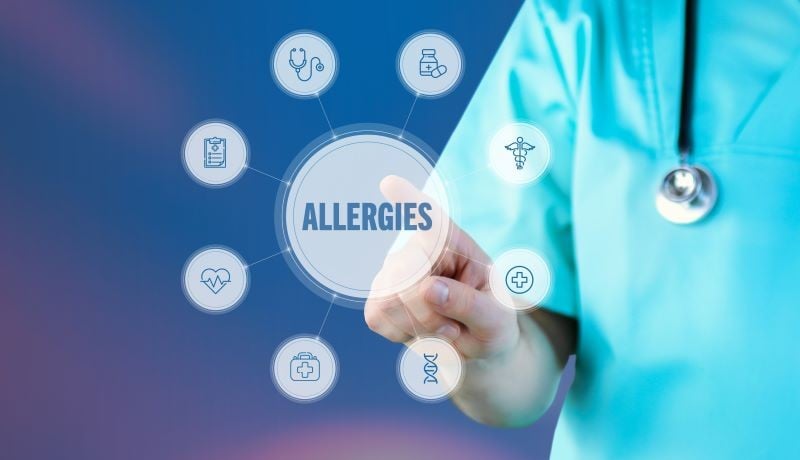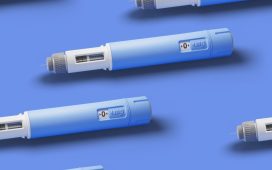By Beth Gilbert HealthDay Reporter
The annual meeting of the American Academy of Allergy, Asthma & Immunology was held from Feb. 23 to 26 in Washington, D.C., drawing participants from around the world, including clinicians, academicians, allied health professionals, and others interested in allergic and immunologic disease. The conference highlighted recent advances in the fields of allergy, asthma, and immunology.
In one study, Martin J ¶nsson, of Orexo AB in Uppsala, Sweden, and colleagues found that developmental amorphous nasal powder formulations of epinephrine may provide a noninvasive and more stable alternative to current autoinjectors for the treatment of anaphylaxis.
The authors compared the pharmacokinetics and physiologic response of novel amorphous nasal powder formulations to a commercially available epinephrine autoinjector (EpiPen). The stability of the powder formulations under accelerated conditions was also assessed. The researchers found that the nasal powders produced comparable plasma levels to EpiPen, together with a desired physiologic response on blood pressure and heart rate, supporting the potential utility for treatment of anaphylaxis. In addition, in contrast to EpiPen, which was significantly degraded, nasal powder formulations were stable during the tested period (12 months in 104 degrees Fahrenheit and six months in 122 degrees Fahrenheit).
“Physicians should advise patients on the suitable storage conditions of epinephrine autoinjectors,” J ¶nsson said. “Our nasal powder formulations are still under development, but if approved, they may provide a noninvasive and more stable alternative to current autoinjectors.”
The study authors are employed by Orexo, which is developing the amorphous nasal powder formulations.
As part of the PRIMERO (Puerto Rican Infant Metagenomic and Epidemiologic Study of Respiratory Outcomes) birth cohort, Jonathan Witonsky, M.D., of the University of California at San Francisco, and colleagues found that attending day care in early life may lower the risk for developing asthma and allergies.
In this ongoing study, the authors enrolled 2,100 children, for whom blood samples were drawn to measure total immunoglobin (Ig)E and allergen-specific IgE markers at a two-year visit. The link between day care attendance in the first year of life and total IgE levels and allergen sensitization was examined. The researchers found that children who attended day care in their first year of life had lower IgE levels. In addition, these children had lower rates of food and perennial allergen sensitization.
“Findings from the PRIMERO birth cohort offer crucial insights into the impact of early-life exposures, including day care attendance, on the development of childhood asthma and allergic diseases,” Witonsky said in a statement.
Vladimir Beloglazov, M.D., Ph.D., of the Georgievsky Medical Academy at the V.I. Vernadsky Crimean Federal University in Simferopol, and colleagues found that rebamipide, an amino acid derivative of 2-(1H)-quinolinone, may help reduce low-grade inflammation among patients with post-COVID syndrome.
The authors evaluated the effectiveness of rebamipide among 62 patients with post-COVID syndrome, aged 42 to 55 years, who were using nonsteroidal anti-inflammatory drugs for joint pain. Patients were divided into two cohorts. One cohort received three daily doses of 100 mg of rebamipide and one daily dose of 20 mg of omeprazole. The other cohort received omeprazole alone. The researchers found that the cohort receiving rebamipide experienced significant improvement of C-reactive protein plasma levels, a marker of inflammation, compared with those in the cohort not receiving rebamipide.
“This study revealed higher levels of lipopolysaccharide-binding protein, and lower levels of bacterial permeability protein in patients with post-COVID syndrome. Thus, this level of inflammation can be explained as lipopolysaccharide-induced, as a consequence of enterocyte damage and tight contacts by the new coronavirus infection and nonsteroidal anti-inflammatory drugs,” Beloglazov said in a statement. “Rebamipide, by reducing intestinal permeability, reduces endotoxin load, lowering the level of low-grade inflammation. It is possible that in patients with increased levels of lipopolysaccharide load, rebamipide is effective, but this requires a larger study and confirmation.”
AAAAI: Nasal Delivery of Epinephrine Safe, Effective for Anaphylaxis
WEDNESDAY, March 6, 2024 (HealthDay News) — Nasal powder formulations of epinephrine are effective and show superior stability to EpiPens, according to a study presented at the annual meeting of the American Academy of Allergy, Asthma & Immunology, held from Feb. 23 to 26 in Washington, D.C.
Read Full Text
AAAAI: Early-Life Day Care Attendance May Lower Risk for Asthma, Allergies
WEDNESDAY, March 6, 2024 (HealthDay News) — Early-life day care attendance may be protective against allergen sensitization, according to a study presented at the annual meeting of the American Academy of Allergy, Asthma & Immunology, held from Feb. 23 to 26 in Washington, D.C.
Read Full Text
AAAAI: Omalizumab Superior to Placebo for Those With Multiple Food Allergies
MONDAY, Feb. 26, 2024 (HealthDay News) — Omalizumab treatment for 16 weeks is superior to placebo for increasing the reaction threshold for peanut and other food allergens among persons with multiple food allergies, according to a study published online Feb. 25 in the New England Journal of Medicine to coincide with the annual meeting of the American Academy of Allergy, Asthma & Immunology, held from Feb. 23 to 26 in Washington, D.C.
Read Full Text
Copyright © 2024 HealthDay. All rights reserved.








